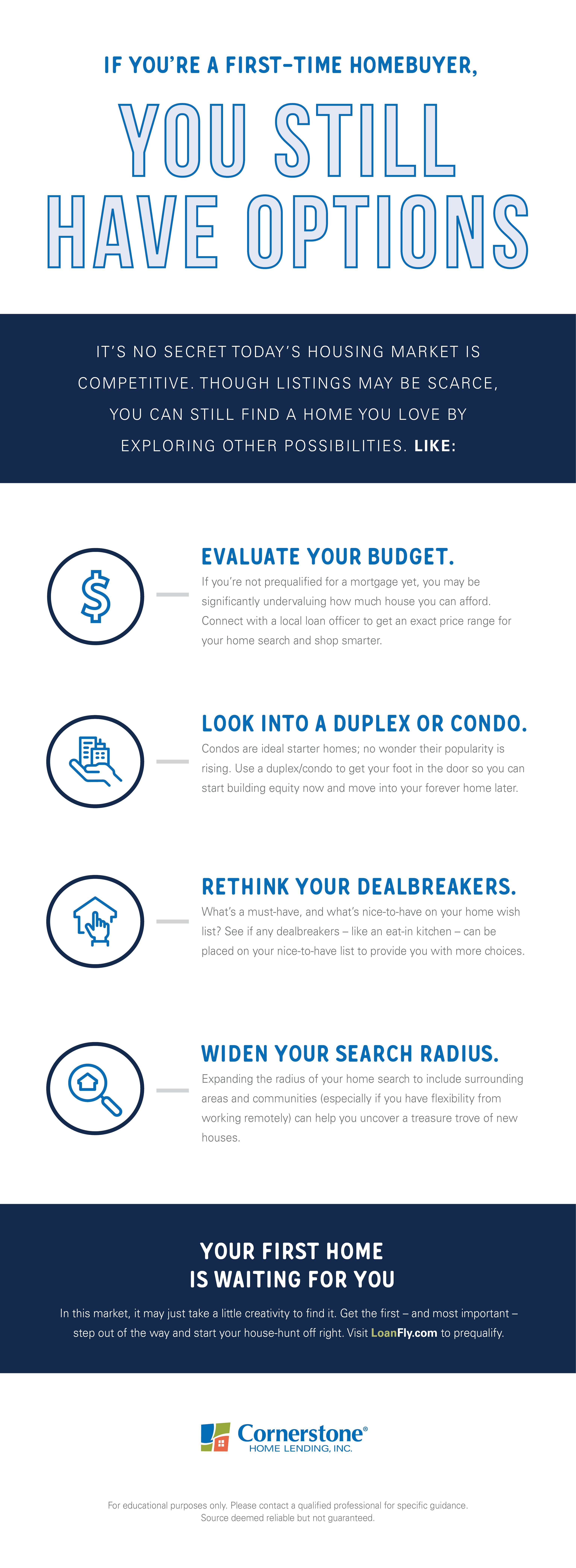
When buying a house for the first time, consider these takeaways:
- In a housing market with this much competition, you may have to get inventive when you hit a roadblock.
- Work with your loan officer for trusted guidance; they can help you prequalify and determine your housing budget, explore mortgage options for duplexes and condos, and weigh your needs so you know exactly what you’re looking for.
- If you’re running into trouble buying a house for the first time, don’t give up yet — your dream home is still out there.
Wondering how much house you can afford? Find out when you prequalify.
Demand isn’t the problem. A lack of supply is.
One of the biggest questions people are asking right now is whether buying a house for the first time still makes financial sense. Some headlines indicate climbing home prices could impact homebuyer demand and, as a result, trigger a slowdown in housing market activity.
Is this true? It’s not likely. Demand isn’t the real issue we’re seeing in today’s market. Rather, it’s low supply — or a shortage of available houses for sale.
A recent Wall Street Journal article confirms this to be true for new construction, noting:
“Homebuilders have sold more homes than they can build. Now they are limiting their sales in an effort to catch up.”
In the article, David Auld, D.R. Horton CEO (the leading homebuilder in the U.S. by volume since 2002), is quoted as saying that they don’t have enough houses to satisfy the number of homebuyers touring their models:
“Through our history, to have somebody walk into our models and to tell them, ‘We don’t have a house for you to buy today’, is something that is foreign to us.”
Danielle Hale, realtor.com’s Chief Economist, goes on to explain that the sale slowdown in the existing market is related to supply hurdles and not demand. Referencing a new wave of listings entering the market, she says:
“…if these changing inventory dynamics continue, we could see a wave of real estate activity heading into the latter part of the year.”
So, homebuyers are still interested and optimistic. There just may not be enough houses to choose from.
We’re experiencing a listing — not a buyer — shortage, and three factors indicate why now is still an ideal time to purchase:
1. Affordability isn’t the issue many make it out to be.
While home prices have increased significantly over the past 18 months, mortgage rates still hover around historic lows. This fact alone makes a monthly mortgage payment affordable for most homebuyers.
Homes may be less affordable than they were a year ago, when rates bottomed out during the onset of the pandemic. But after adjusting for inflation, a house today is still notably more affordable than it was in the 1970s, 1980s, 1990s, and many parts of the 2000s.
2. Owning is a better bet than renting over the long-term.
A new study confirms that renting eats up a larger percentage of household income compared to owning a home. The analysis shows that a renter, putting 30 percent of their income toward monthly housing expenses today, could expect to allot 30.2 percent of their income by the end of the year.
A homeowner currently only puts 19.4 percent of their monthly income toward housing and could expect this to increase to 23.1 percent by year’s end. A monthly mortgage payment (principal and interest) is also likely to be stable over the life of a loan, while rent rises nearly every year.
3. Owners grow their own wealth, while renters grow wealth for their landlords.
Whether you own a home or invest in real estate, you have the opportunity to build your investment through equity that accumulates year-over-year. When you own, your household directly benefits from your accruing wealth.
Mark Fleming, First American Chief Economist, notes:
“The major financial advantage of homeownership is the accumulation of equity in the form of house price appreciation… We have to take into account the fact that the shelter that you’re owning is an equity-generating or wealth-generating asset.”
Right now, this equity growth is considerable. According to the National Association of REALTORS® (NAR):
“The median sales price of single-family existing homes rose in 99 percent of measured metro areas in the second quarter of 2021 compared to one year ago, with double-digit price gains in 94 percent of markets.”
Ninety-four percent of markets saw more than a 10-percent increase in a home’s median price. So, if you purchased a $400,000 home in one of these regions, your net worth would have risen by roughly $40,000. For a renter, your landlord would be the recipient of this wealth.
Housing demand is still incredibly strong for these reasons. If you’re having a hard time finding listings, use one or all of our tips above to expand your options.
Get prequalified & gain the power to negotiate
The advantage you need to stand out in today’s competitive market is right in the palm of your hand. Our free LoanFly app has a special tool you can use to instantly create your own prequalification letter to help strengthen your offer on a house. Download LoanFly if you want access to PQ On Demand.
For educational purposes only. Please contact your qualified professional for specific guidance.
Sources are deemed reliable but not guaranteed.

